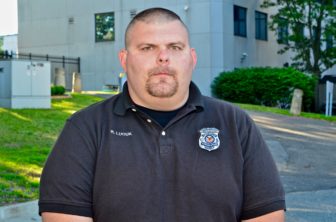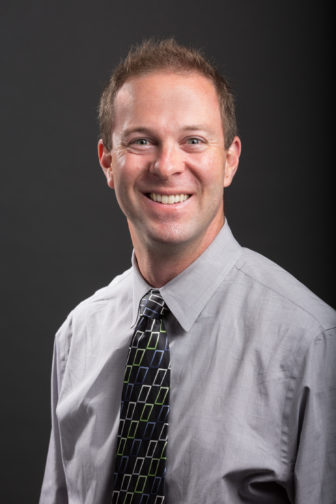Last winter, a veteran was revived with Narcan after he overdosed on heroin and collapsed just outside the doors of the VA hospital in West Haven. In 2016, another veteran at the West Haven facility was not so lucky. He died of an overdose in a public restroom.
To battle this growing scourge, Connecticut’s VA Healthcare has implemented initiatives to care for more than 1,000 veterans addicted to opioids and the federal government has awarded Yale University School of Medicine $9.7 million to research nondrug treatment for pain in veterans and military personnel, and provide national leadership in the effort.

CT VA Photo.
Lieutenant Richard Lucuk is one of 34 VA police officers now trained to administer naloxone.
VA initiatives include: equipping nonmedical staff and veterans with medication that reverses overdoses; requiring psychiatric emergency room physicians to be licensed to prescribe drugs that reduce opioid cravings; and offering alternatives to opioids for pain treatment.
Nationally, veterans using VA health care have twice the risk of opioid drug overdoses than the general public, according to the U.S. Department of Veterans Affairs.
Maria E. Niculete, a clinical psychologist at the Connecticut VA, said many veterans have been prescribed opiates for pain from service-related injuries.
“There was a significant increase in prescription opioids from 2004 through 2012 as veterans started returning home from post 9/11 deployments and sought treatment for chronic pain,” Niculete said.
In the last year, VAs nationally treated nearly 68,000 veterans for opioid addiction, a spokesperson said. In Connecticut, 1,002 veterans were treated for opioid addiction from April 1, 2016, through March 30, 2017, according to the VA in Washington.
In August, the Connecticut VA gave kits of nasal spray naloxone, which reverses overdoses and has a brand name of Narcan, to about 200 nonmedical staff including social workers who counsel veterans in their homes, soup kitchens and homeless shelters; VA police; and veterans who mentor other veterans. That’s in addition to more than 800 nasal spray kits handed out to veterans since January 2015.
Lindsay Buxbaum, a VA social work supervisor, said it was frustrating that veterans had kits, but social workers making visits weren’t authorized to use them. “It’s not a great feeling,” she said, adding that many of their clients are opiate dependent or recovering from dependence and some have died of overdoses. “Unfortunately, people do relapse. For us to be able to have this tool to help save people’s lives, we’re all really excited to be able to carry it,” she said.
A VA police officer, Lieutenant Richard Lucuk, said the veteran who was revived after overdosing close to the emergency room might have died if he had been elsewhere on VA property. But, now, he said, with the 34 VA police officers able to administer the nasal spray in parking lots and VA buildings where there is “no medical staff on hand,” lives can be saved.
Army veteran Lonnie Groom, 61, of New Haven, survived two overdoses because of naloxone. Now, after 45 years of “off and on” drug use, he’s been sober for more than a year and has received a naloxone kit from the VA.
“I still know people” with drug addictions, Groom said. “If I can help them, I’d be more than happy to do so. I see myself in them because I used to be like them,” he said.

Dr. Brian Fuehrlein.
Dr. Brian Fuehrlein, director of the Connecticut VA psychiatric emergency department, said it could take as little as six months for a prescription drug addiction to become a heroin addiction. He said most heroin users he treats are in their 20s and 30s and started using drugs with prescription opioids, either obtained legally for pain from service-related injuries or illegally to get high.
He said his department—one of four VA psychiatric emergency departments nationally—has a “novel” comprehensive approach. Its doctors are all licensed to prescribe buprenorphine, which reduces opioid cravings. Patients are sent to VA follow-up treatment, such as a five-hour-a-day program and buprenorphine clinics in West Haven and Newington, and are referred to Narcotics Anonymous.
The VA has been decreasing opioid prescriptions, particularly for chronic pain. Nationally, veterans given opioid prescriptions at VAs dropped 33 percent from 657,376 in July 2012 to 457,643 in March 2017. At the Connecticut VA, 16.5 percent fewer veterans were prescribed opioids, from 7,443 in 2012 to 6,214 in 2016, according to statistics obtained through a Freedom of Information Act request.
The Yale researchers studying nondrug pain management have CT VA ties. Dr. Robert Kerns, former director of the VA Pain Management Research Center, will head a national resource center for clinical trials on nondrug pain management. Dr. Alicia Heapy, associate director of the Pain Research Center, will test cognitive behavioral therapy for chronic pain using interactive voice response. Dr. Marc Rosen, VA director of addiction recovery services, and Dr. Steve Martino, VA chief of psychology, will study effectiveness of screening, brief intervention, and treatment referral. Their work will be part of an $81 million, federally funded research project.
Some 50 percent of veterans and 45 percent of service members endure pain regularly, according to studies.
A Connecticut VA pain clinic already recommends nonmedical treatments, including physical therapy, cognitive behavior and exercise for some patients, said Sara Edmond, a clinical psychologist and pain management specialist.
“Many of us believe if we offer patients other methods of managing their pain, it might reduce their reliance on opioids,” Edmond said.
I think that we owe veterans a satisfactory, predictable, and ACCESSIBLE standard of care within the Veterans Health Administration (commonly referred to as the VA), especially in the area of mental health
I’ve been doing research on veterans in regards to addiction, mental health and suicide when I came across a really good article. Should anyone else be interested to see how this would help others here’s the page I looked at https://oceanbreezerecovery.org/blog/veteran-addiction-part-1/
Hopefully, this helps as one fallen soldier is one too many.
Thank you for the great article.I need help bad for Opioid pain killers and have been on them over 8 years..Thanks again.Mike Phelps